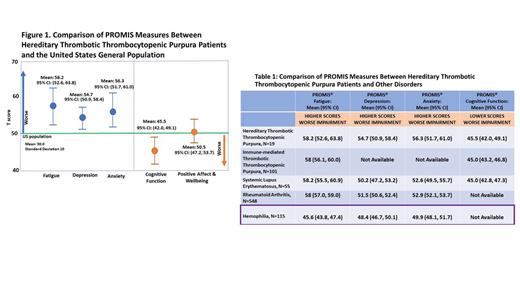Introduction: Hereditary thrombotic thrombocytopenic purpura (hTTP) is a rare inherited blood disorder caused by severe ADAMTS13 deficiency. There is a gender disparity with an increased incidence among women who are often diagnosed during pregnancy. Disease severity is variable with some patients requiring lifelong prophylaxis treatment while others require minimal or no treatment. Very little is known about the long-term impact of hTTP on psychological health, cognitive health and the quality of life of patients. In our previous study, patients frequently described neuropsychiatric symptoms such as depression, forgetfulness, and poor concentration (Borogovac, Blood 2022; 140:785-789). The goals of this study were to compare patient reported outcomes (PROs) between hTTP patients and the general population, compare hTTP to other disorders, and describe changes in these scores over time.
Methods: hTTP patients were recruited from the United States (US) site of the international hTTP Registry. Following informed consent, PROMIS (Patient-Reported Outcomes Measurement Information System) fatigue, depression, anxiety, cognitive function, and positive affect/well-being measures were sent to patients via a secure REDCap link. Patients were assessed twice (baseline and 6-months). A one sample t-test compared mean scores in hTTP patients to the US population (mean 50, standard deviation 10). A paired t-test compared mean scores between the baseline and 6-month assessment.
A literature search identified comparison disorders that reported PROMIS results. Descriptively, means and 95% confidence intervals (CI) were compared between hTTP and the other disorders.
Results: Nineteen patients (16 adult; 3 pediatric) completed the baseline assessment. Their median age was 38 years (range 5 to 66 years), the majority were female (68.4%), had private insurance (63.2%) and lived near their hematologist (63.2% within 25 miles). Fifteen patients completed measures at both time points (baseline and 6-months).
At baseline, hTTP patients were significantly worse than the US population on four domains of health: fatigue (p=0.0063), depression (p=0.02), anxiety (p=0.01), and cognitive function (p=0.02) (Figure 1). However, hTTP patient scores were not different from the US population for the domain of positive affect/well-being (p=0.78) (Figure 1). hTTP patients had similar PROMIS scores as patients with immune-mediated TTP, systemic lupus erythematosus, and rheumatoid arthritis (Table 1). However, hTTP patients had worse fatigue, depression, and anxiety than patients with hemophilia (Table 1).
Among the 15 patients who completed both the baseline and 6-month assessments, there was no change in the mean fatigue (p=0.90), depression (p=0.29), anxiety (p=0.81), or cognitive function (p=0.89) scores.
Conclusion: This is the first study to identify the impact of hTTP from the patient's perspective. Our results show that hTTP patients have significantly worse fatigue, depression, anxiety, and cognitive function than the US population with scores similar to patients with other chronic autoimmune disorders. However, hTTP patients had worse fatigue, depression, and anxiety than hemophilia patients which is a comparable genetic disorder. hTTP patients' scores did not improve over time which shows this disease has a persistent burden on patients. In future studies, it will be vital to incorporate the patient perspective to better understand the burden of both the disease and the treatment within this population. This approach will facilitate the development of new treatments that cater to patients' needs and preferences, ensuring a highly acceptable side effect profile and ultimately improving outcomes.
Disclosures
Schraner:NovoNordisk: Other: Congress Travel Support. Kremer Hovinga:SOBI: Other: Congress Travel Support; Roche: Other: Lecture Fees; Baxter/Takeda: Membership on an entity's Board of Directors or advisory committees, Research Funding, Speakers Bureau; Ablynx/Sanofi: Honoraria, Membership on an entity's Board of Directors or advisory committees, Speakers Bureau. Terrell:Sanofi: Consultancy.


This feature is available to Subscribers Only
Sign In or Create an Account Close Modal